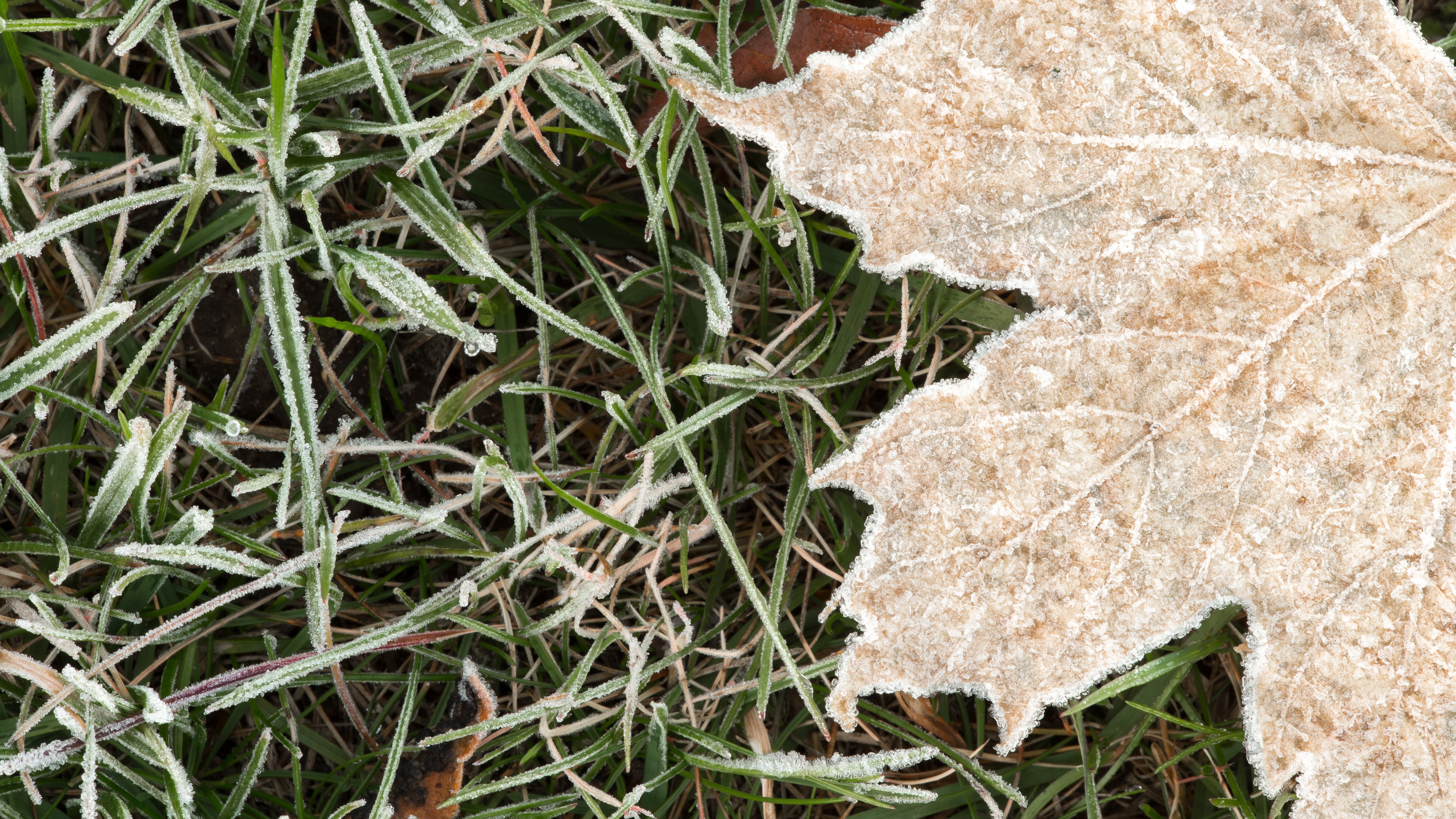
Winterizing the Garden
As winter approaches---Think spring! By preparing your gardens for winter, you will help ensure that the landscape will flourish in the spring. Even though your garden may be looking tired and ready to rest, keeping the plants protected and healthy during this time will result in strong roots and growth when the weather starts to warm back up in the spring. Following are some items that should be on your to do list now and into winter:
Watering: Although water needs are definitely less in the winter months, make sure to keep the roots of evergreen plants hydrated especially when rain is scares. A dried-out plant will suffer windburn, frost damage, and stress far easier than one that has moisture in it.
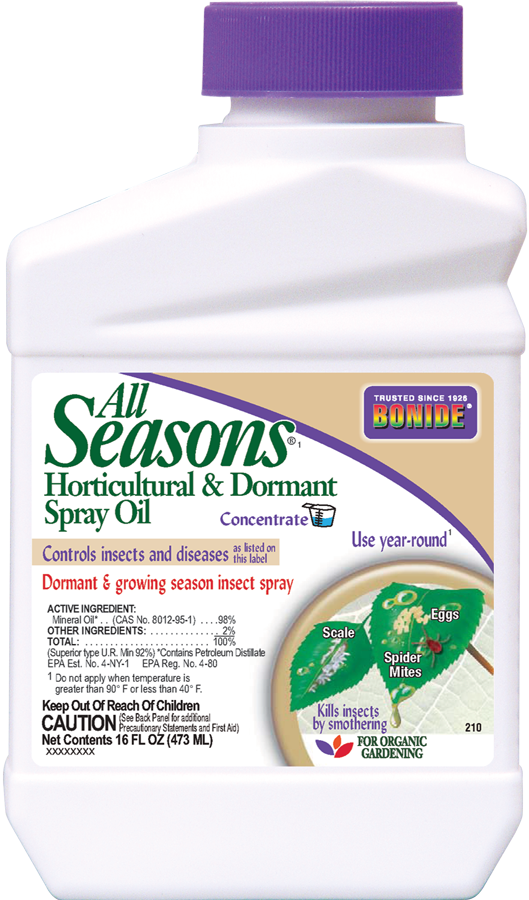 Dormant spraying: To protect your fruit trees, roses and other plants from diseases, such as peach leaf curl, and apple scab, using a copper fungicide is a necessity.
Dormant spraying: To protect your fruit trees, roses and other plants from diseases, such as peach leaf curl, and apple scab, using a copper fungicide is a necessity.
Copper is a preventative, not a curative spray, so it needs to be applied timely and as per the label for each type of plant and disease. For peach leaf curl on peaches and nectarines, the first spray should be at leaf drop (around Thanksgiving), and two more applications. One at the end of December and the last spray applied early to mid-February at popcorn stage of buds (swollen buds, not broken open yet) to avoid damage. Use the indicated rate on the bottle and make sure all surfaces are covered thoroughly. To kill off overwintering bug eggs, use All Seasons Horticultural & Dormant Oil. This oil will smother aphids, spider mites, mealybugs, white flies, scale insects and more that are sitting dormant waiting for the temperature to warm up so they can feed away on new spring growth. Copper and oil can be combined to take care of both diseases and insects, and the oil helps the copper spread on the branches and stick better. As with any product, please read the labels and follow instructions carefully.
Weed control: Weeds and weed seeds are sitting dormant during the winter months, just waiting for some warmth and moisture to allow them to invade the gardens. There are two basic types of herbicides: pre-emergents, which inhibit the germination of seeds and post-emergents, which kill weeds once they have sprouted. We carry both chemical controls and organic alternatives. Using a pre-emergent as advised per the product label and/or mulching will help reduce the weed population in spring.
Frost protection: Different plants have varying levels of natural frost protection, and there are multiple factors that impact a plant’s ability to withstand the cold. Early fall frosts, sustained frosts for multiple nights and late spring frosts can damage or even kill plants that might be fine otherwise. It is important that you know your plant’s average minimum frost tolerance and be proactive in protecting them from the cold. If a plant is hardy down to 32 degrees, but the temperature dips to 31 degrees, the top of the plant may be damaged, or it may be frozen completely to the ground. If unsure if something is dead or just damaged, do not prune anything back until the following spring, as the damaged parts may be protecting the next lower level of growth from another freeze. Resist the urge to clean up the plants too early. Potted plants can be moved under eaves or up against the house for added protection. Apply a layer of organic mulch to insulate roots from cold temperatures.
Below are some products that can be used to offer additional frost protection:
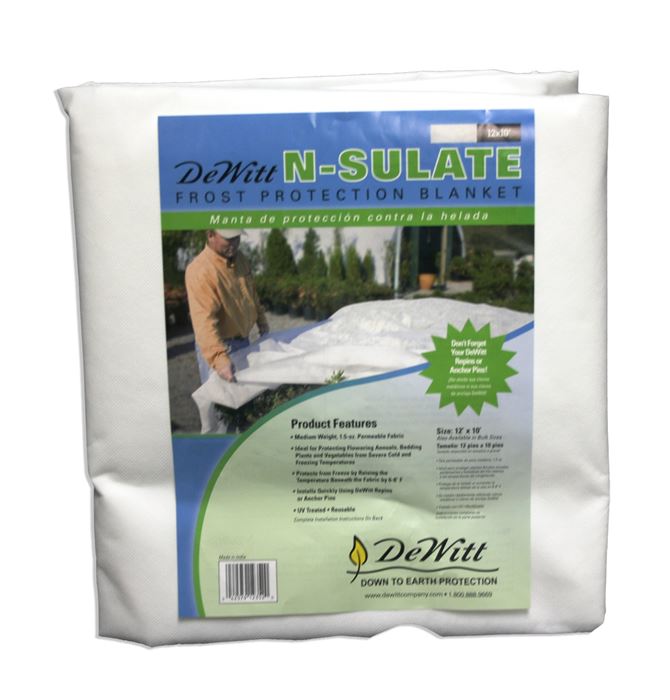 Frost cloth is a water repellent, breathable, white woven material that can give a few degrees of frost protection. We carry an excellent product called N-Sulate, and it can protect down to 22 to 25 degrees. Tent your plants, and secure the sides with clothes pins, or hold edges to ground with bricks. N-Sulate allows light to come through, so it can be left on for multiple days if needed. We carry this in 10 by 12 foot sheets and 6 by 50 foot rolls. Do not use plastic sheeting as a cover, as condensation forms underneath and the water will freeze to the leaves and cause damage. Bed sheets and blankets can absorb moisture from the air and potentially cause the same problem.
Frost cloth is a water repellent, breathable, white woven material that can give a few degrees of frost protection. We carry an excellent product called N-Sulate, and it can protect down to 22 to 25 degrees. Tent your plants, and secure the sides with clothes pins, or hold edges to ground with bricks. N-Sulate allows light to come through, so it can be left on for multiple days if needed. We carry this in 10 by 12 foot sheets and 6 by 50 foot rolls. Do not use plastic sheeting as a cover, as condensation forms underneath and the water will freeze to the leaves and cause damage. Bed sheets and blankets can absorb moisture from the air and potentially cause the same problem.- Wilt-Stop is a natural, non-toxic product derived from the resin of pine trees. It forms a flexible barrier on leaves and stems that
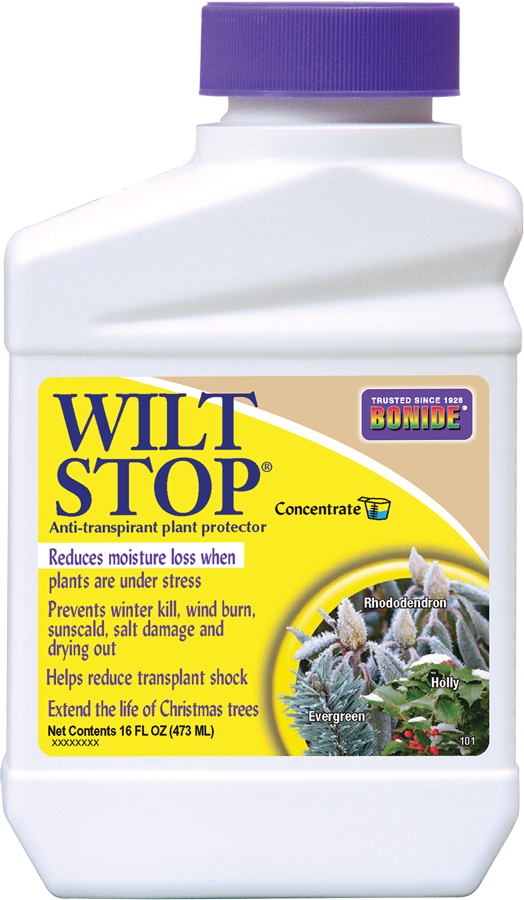 protects them from drying out from the cold and holds the water in the leaves together, so the cells can’t burst and kill the leaves. Wilt stop can provide a few degrees of frost protection and is an alternative option for those who do not want to have to cover their plants with frost cloth. Wilt-Stop needs to be applied in fall before the first freeze and again mid-winter and early spring. Another great use for Wilt-Stop is to keep your Christmas tree, garland and wreaths from drying out indoors as quickly, and also gives the holiday aroma of pine.
protects them from drying out from the cold and holds the water in the leaves together, so the cells can’t burst and kill the leaves. Wilt stop can provide a few degrees of frost protection and is an alternative option for those who do not want to have to cover their plants with frost cloth. Wilt-Stop needs to be applied in fall before the first freeze and again mid-winter and early spring. Another great use for Wilt-Stop is to keep your Christmas tree, garland and wreaths from drying out indoors as quickly, and also gives the holiday aroma of pine. - Christmas lights (not LED) can be wrapped around plants to provide a small degree of protection as well.
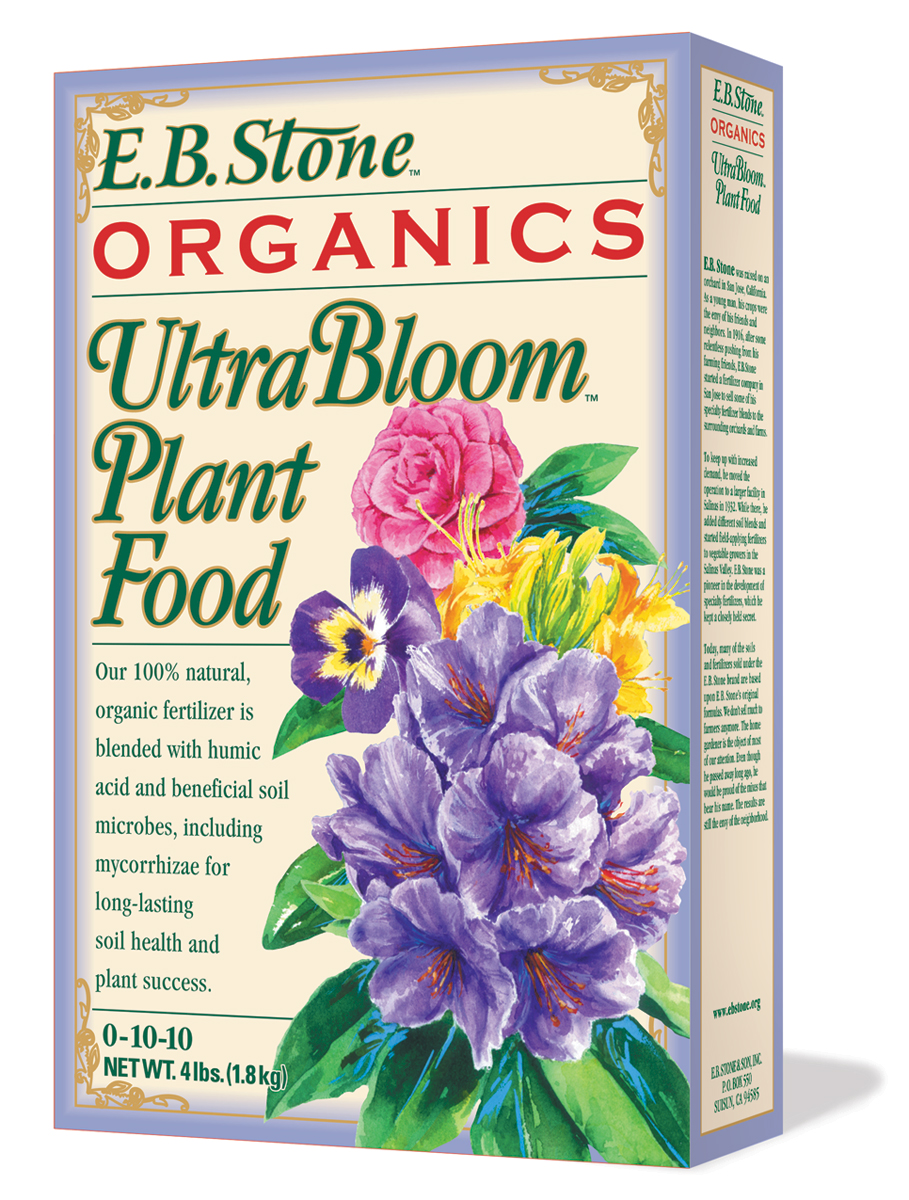 Fertilizing: To boost your plants’ strength and vigor during their dormant season, and to promote bud and fruit production in the spring, a monthly application of EB Stone Organics Ultra Bloom 0-10-10 is very beneficial and highly recommended. This formulation contains no nitrogen, as pushing new growth is definitely not wanted in the colder months. The second and third two numbers are phosphorus and potassium, which among other things, helps to promote blooms and strengthen the roots and stems of the plants.
Fertilizing: To boost your plants’ strength and vigor during their dormant season, and to promote bud and fruit production in the spring, a monthly application of EB Stone Organics Ultra Bloom 0-10-10 is very beneficial and highly recommended. This formulation contains no nitrogen, as pushing new growth is definitely not wanted in the colder months. The second and third two numbers are phosphorus and potassium, which among other things, helps to promote blooms and strengthen the roots and stems of the plants.
For more specific information and any questions on any of the above subjects, please feel free to ask any of our knowledgeable nursery staff for assistance. We are all here to help make your garden come alive with beauty in the spring!
By MARK ERICKSON
Plant Buyer



